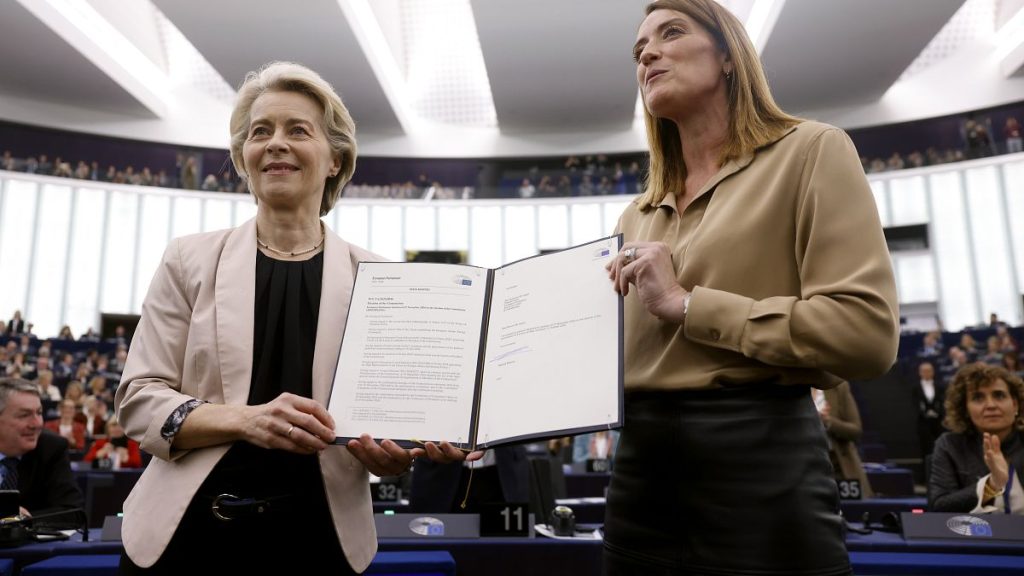A Tumultuous Year in the European Parliament: From Farmer Protests to Political Power Shifts
The year 2024 proved to be a period of significant transformation for the European Parliament, marked by the July elections that reshaped its composition and power dynamics. Beyond the electoral upheaval, a series of dramatic events and contentious debates unfolded within the chamber’s walls, leaving an indelible mark on the institution’s trajectory. From farmer protests and powerful speeches to landmark legislative battles and unexpected alliances, the European Parliament navigated a complex landscape of challenges and opportunities.
The year commenced with a wave of farmer protests across Europe, culminating in a large-scale demonstration in Brussels. Farmers from various countries converged on the European Parliament, expressing their discontent with EU trade deals and environmental policies impacting the agricultural sector. The protests underscored the deep-seated anxieties within the farming community and foreshadowed the intense debates that would later consume the Parliament concerning the Nature Restoration Law.
Amidst this backdrop of unrest, a poignant moment of unity emerged during Yulia Navalnaya’s address to the Parliament following the suspicious death of her husband, Alexei Navalny, in a Russian prison. Her powerful tribute to her husband’s courage and condemnation of Vladimir Putin resonated deeply with MEPs, highlighting the Parliament’s unwavering support for human rights and democratic values. Her call for innovation and a departure from conventional approaches in confronting authoritarian regimes left a lasting impression.
The latter part of the year witnessed a fierce battle over the Nature Restoration Law, a proposal aimed at rehabilitating degraded ecosystems across the EU. The European People’s Party (EPP) launched a vigorous campaign against the law, raising concerns about its potential impact on food production and farmers’ livelihoods. The EPP’s opposition, amplified by right-wing forces, ignited a heated debate with progressive MEPs, environmental groups, and even multinational corporations who emphasized the crucial role of ecological restoration for economic prosperity and sustainable supply chains. The eventual approval of a watered-down version of the law reflected the deep divisions within the Parliament on this critical issue.
Another significant milestone in 2024 was the long-awaited vote on the EU’s migration and asylum policy reform. After four years of deliberations, the "Pact on migration and asylum" was adopted, albeit amidst considerable controversy. The pact, supported by the EPP, S&D, and Renew Europe, introduced a solidarity mechanism for sharing the responsibility of welcoming asylum seekers and established stricter border controls. However, it faced strong opposition from right-wing parties, the Greens/EFA, and the Left group, who criticized its potential impact on the right to asylum. The new rules, slated to take full effect in mid-2026, signaled a shift in the EU’s approach to migration and asylum.
Beyond these significant legislative battles, the European Parliament also grappled with symbolic yet divisive issues. The resolution to include the right to abortion in the Charter of Fundamental Rights sparked heated debate and highlighted the diverging views within the chamber. While the resolution was passed, its non-binding nature underscored the complexities of addressing such sensitive issues at the EU level.
The final weeks leading up to the European elections saw a flurry of legislative activity, with the Parliament voting on a wide range of crucial files. From the right-to-repair directive and regulations on forced labor to new rules for digital platform workers and the first-ever EU law against gender-based violence, the Parliament’s final push showcased its commitment to addressing pressing social and economic challenges.
The post-election landscape brought further changes to the Parliament’s power dynamics. The emergence of the "Venezuela majority," an alliance of center-right, right-wing nationalist, and far-right groups, signaled a shift in the political balance. This new alliance played a significant role in the decision to award the Sakharov Prize to Venezuelan opposition figures, demonstrating the influence of conservative forces within the newly constituted Parliament.
A heated exchange between European Commission President Ursula von der Leyen and Hungarian Prime Minister Viktor Orbán during the October plenary session further exemplified the tensions within the EU. The clash over the war in Ukraine exposed deep divisions on foreign policy and highlighted the ongoing challenges posed by differing perspectives within the bloc.
The final approval of Ursula von der Leyen’s College of Commissioners in November, albeit with lower than expected support, revealed the fragility of the governing coalition. Defections from various political groups underscored the complexities of building consensus within the increasingly diverse European Parliament. The lukewarm endorsement of the Commission foreshadowed potential challenges for von der Leyen’s second term.
Amidst the weighty political debates, the European Parliament also experienced moments of levity and unexpected occurrences. From a dog barking during a session to an Irish MEP’s outburst and a Slovak MEP’s symbolic release of a dove, these lighter moments provided a brief respite from the often intense atmosphere of the chamber. These instances, however trivial, served as a reminder of the human element within the complex machinery of European politics. The year 2024, in all its complexity and drama, ultimately underscored the European Parliament’s vital role as a forum for debate, decision-making, and representation in a rapidly changing world.














